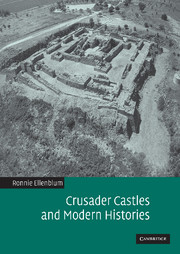Book contents
- Frontmatter
- Contents
- List of illustrations
- List of tables
- Acknowledgements
- Part I National discourse and the study of the Crusades
- 1 From moral failure to a source of pride
- 2 The narrative of the Crusades and the nationalist discourse
- 3 Nationalist discourse and Crusader archaeology
- Part II Crusader studies between colonialist and post-colonialist discourse
- Part III Geography of fear and the spatial distribution of Frankish castles
- Part IV The castle as dialogue between siege tactics and defence strategy
- Conclusion
- Appendix
- Bibliography
- Author index
- Subject index
2 - The narrative of the Crusades and the nationalist discourse
Published online by Cambridge University Press: 29 July 2009
- Frontmatter
- Contents
- List of illustrations
- List of tables
- Acknowledgements
- Part I National discourse and the study of the Crusades
- 1 From moral failure to a source of pride
- 2 The narrative of the Crusades and the nationalist discourse
- 3 Nationalist discourse and Crusader archaeology
- Part II Crusader studies between colonialist and post-colonialist discourse
- Part III Geography of fear and the spatial distribution of Frankish castles
- Part IV The castle as dialogue between siege tactics and defence strategy
- Conclusion
- Appendix
- Bibliography
- Author index
- Subject index
Summary
THE BIRTH OF THE FRENCH NARRATIVE: JOSEPH-FRANçOIS MICHAUD (1767–1839)
It is rather surprising that none of the scholars who dealt with the Crusades in the late eighteenth and early nineteenth centuries made any special reference to the national origins of the Crusaders. Even the participants in the competition organised by the Académie Française, who found that the Crusades influenced almost every imaginable sphere of human life, did not maintain that they were connected to this or that nationality, or that the Crusades should be studied within a national context.
The beginnings of such a nationalist discourse on the Crusades can be traced to the late 1830s by comparing texts appearing in the early 1820s with similar ones published twenty years later. Joseph-François Michaud's monumental Histoire des Croisades is a perfect case in point. The first edition of this popular work was published between 1817 and 1822; four further editions appeared during the period of the Restoration, five more during that of the July Monarchy, and an additional ten editions before the end of the nineteenth century. Michaud did not update the later editions, but in the late 1830s, together with his devoted friend Jean Joseph François Poujoulat, who a few years earlier had accompanied him on a pilgrimage to the Holy Land, he wrote an abridged version ‘for the young generation’, published in 1839, shortly after Michaud's death. Though most chapters of the abridgement are based on the Histoire, closer scrutiny reveals that the historiographical outlook had undergone substantial change.
- Type
- Chapter
- Information
- Crusader Castles and Modern Histories , pp. 18 - 31Publisher: Cambridge University PressPrint publication year: 2007



